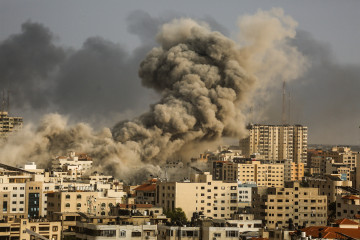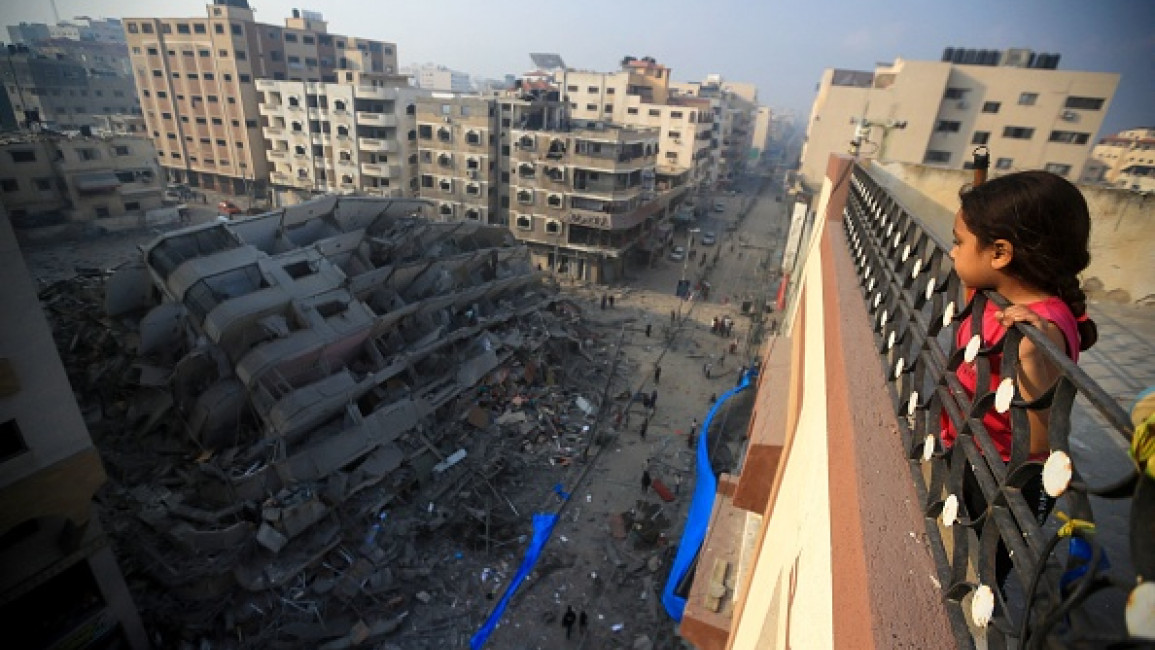

Throughout 2023, the Biden administration has been investing massive amounts of diplomatic energy into trying to bring the Kingdom of Saudi Arabia into the Abraham Accords.
But in light of Hamas’ surprise attack against southern Israel over the weekend and the Israeli response to the Izz al-Din al-Qassam Brigades’ unprecedented incursion, the prospects of a Riyadh-Tel Aviv normalisation accord have dimmed.
This is not to say that the Kingdom’s informal relationship with Israel will suddenly end. It definitely won’t. Nor is it to assert that Saudi-Israeli normalisation can’t eventually happen down the line.
"If violence in Palestine further intensifies or if this warfare chaotically spreads into a wider regional conflict, the chances of Saudi Arabia entering the Abraham Accords any time soon will only further decrease"
However, imagining Riyadh signing a normalisation deal with Tel Aviv in this upcoming period is extremely difficult.
If violence in Palestine further intensifies or if this warfare chaotically spreads into a wider regional conflict, the chances of Saudi Arabia entering the Abraham Accords any time soon will only further decrease.
Home to Mecca and Medina, the two holiest sites in Islam, Saudi Arabia has a special leadership role in the wider Islamic world. The Saudi ruler has officially been the 'Custodian of the Two Holy Mosques' since 1986. This factor helps us understand why the Kingdom has at least not yet normalised with Israel.
Given the importance of Palestine to Arabs and Muslims worldwide, the leadership in Riyadh is aware of the ways in which regional and global perceptions of the Saudi monarchy abandoning the Palestinian struggle while openly partnering with Israel could severely damage the Kingdom’s religious legitimacy.
Along with all other actors in the Middle East, Saudi Arabia and the rest of the Gulf Cooperation Council (GCC) face much uncertainty. There are countless unknown variables that could lead to many unpredictable scenarios throughout the rest of 2023. State and non-state actors across the region are bracing themselves for so many potential outcomes.
The past several days of horrific violence in Israel-Palestine have thrown Saudi officials’ calculations about the normalisation question into “total disarray because they do not know what is going to happen as a result of this conflict,” said Dr Hussein Ibish, a senior resident scholar at the Arab Gulf States Institute in Washington, in an interview with The New Arab.
Likely on the minds of Saudi officials are a host of important questions that Dr Ibish identified:
- After withdrawing ground forces from Gaza in 2005, will Israel send its soldiers back to re-occupy the besieged enclave?
- How much vengeance will there be in Israel’s military response to the 7 October Hamas attack and what will be the degree of mayhem that Palestinians suffer?
- Outside of Palestine, how much blame will Arabs and Muslims place on Hamas for the death and property destruction in Gaza?
- Will the warfare spread into the West Bank and East Jerusalem? If so, what will happen to East Jerusalem’s holy sites?
- Will Lebanese Hezbollah involve itself and force Israel to face the Iranian-led “axis of resistance” in a war with multiple fronts?
- Given Tehran’s role as a sponsor of Hamas, Islamic Jihad, and Hezbollah, would Israel dare launch strikes against targets inside Iran?
“No one has any idea what the answer to these and so many other questions might be,” Dr Ibish told TNA.
“But Saudi Arabia cannot make its strategic calculation until it has some idea about what, if any, of these things is going to take place and how they will be perceived by various players and publics around the region [and] the globe. There are too many imponderables for Saudi Arabia to do anything other than wait and see and hope for the best.”
|
|
Enter Iran
With Saudi Arabia having signed its diplomatic deal with Iran in Beijing seven months ago, the Riyadh-Tehran détente matters a lot to the Kingdom’s foreign policy decision-making vis-à-vis Israel-Palestine.
As Crown Prince and Prime Minister Mohammed bin Salman seeks to continue healthy dialogue with the Islamic Republic’s rulers, bring his country out of Yemen’s conflict(s), and make Vision 2030 successful, Riyadh is not currently seeking any major confrontation with Iran.
Nor does Saudi Arabia want to get caught up in a war that could possibly break out between Israel and Iran. Saudi Arabia wants to ensure that Iran would not see the Kingdom as allied with Israel against Tehran under such circumstances.
"The GCC responses have…ranged between calling for restraint while criticising Israel and blaming Israel entirely"
The battle of narratives and ideas between two Muslim powers with longstanding rivalries can’t be dismissed. As much as tensions between Saudi Arabia and Iran have lowered since the 10 March diplomatic deal was signed in China, suspicions between Riyadh and Tehran remain high.
The two governments’ ideologies and visions for the Middle East remain fundamentally at odds. Since Iran’s 1979 Islamic Revolution, the leadership in Tehran has communicated its message to Muslim communities worldwide that the Al Saud family lacks the religious legitimacy necessary to lead the Islamic world.
Saudi Arabia normalising with Israel at this particular time could serve Iranian narratives in ways that are terrifying to Riyadh.
The smaller GCC states
As the violence worsens in Gaza, the five smaller GCC states also face challenges in terms of assessing different options for responding. As Ryan Bohl, a Middle East and North African analyst at the risk intelligence company RANE, told TNA, all GCC states are now “stuck in an uncomfortable position in which they are either implicitly or explicitly pro-Israel and pro-Palestine at the same time and are having to find a way to navigate that narrative”.
The United Arab Emirates (UAE) and Bahrain, which both joined the Abraham Accords in 2020, are now dealing with heightened security risks that could become more serious depending on how this warfare in Israel-Palestine plays out regionally and internationally.
Officials in Abu Dhabi and Manama must carefully balance their interests in benefitting from normalised relations with Israel, on one hand, with considering attitudes on the ‘Arab Street’, on the other.
Although the six GCC states have different relationships with Israel, they all had no choice but to quickly come out and address the violence in Israel-Palestine one way or another. “The GCC responses have…ranged between calling for restraint while criticising Israel and blaming Israel entirely,” Dr Ibish told TNA. “But all of them have suggested that Israel bears at least a good deal of the blame. In words, these countries are still Arab countries.”
|
|
Differences in how the GCC members have responded thus far highlight the extent to which divisions within the sub-regional institution remain deep despite the historic January 2021 al-Ula summit.
On one side of the spectrum is Qatar, the GCC’s most Palestine-friendly state. The Qatari foreign ministry’s official statement in response to the 7 October Hamas attack against southern Israel put all the blame on the Israeli occupation without condemning Hamas.
On the other end, the UAE’s Ministry of Foreign Affairs released a statement one day later which emphasised that “attacks by Hamas against Israeli towns and villages near the Gaza strip, including the firing of thousands of rockets at population centres, are a serious and grave escalation” while condemning reports of Hamas fighters abducting Israeli civilians as hostages.
"With Saudi Arabia having signed its diplomatic deal with Iran in Beijing seven months ago, the Riyadh-Tehran détente matters a lot to the Kingdom's foreign policy decision-making vis-à-vis Israel-Palestine"
An unwelcome crisis
Regardless of differences in how the GCC states have positioned themselves toward Hamas and Israel, the truth is that all six of them have so much to lose from this bloodshed in Israel-Palestine.
This is particularly so given the risks of a wider conflict breaking out, especially if Iran is involved. The relative calm that the Gulf has experienced these past three years is not something that any policymaker in a GCC state takes for granted.
In this upcoming period, we can expect some Gulf Arab governments to try to play their cards in ways that could help de-escalate between Israel and its Palestinian and Lebanese enemies.
However, there is unfortunately no guarantee that such efforts on the part of any GCC member will prove successful.
Giorgio Cafiero is the CEO of Gulf State Analytics.
Follow him on Twitter: @GiorgioCafiero





 Follow the Middle East's top stories in English at The New Arab on Google News
Follow the Middle East's top stories in English at The New Arab on Google News


